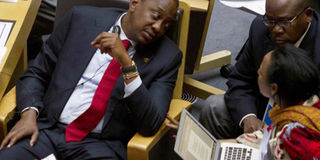Majority support ICC cases, says survey

PHOTO | AFP Kenyan President Uhuru Kenyatta (left) speaks with Cabinet secretary for Foreign Affairs Amina Mohammed (right), and Attorney General Githu Mungai (second right) at the African Union ahead of a special summit on the continent's relationship with the International Criminal Court (ICC) on October 12, 2013.
What you need to know:
- Approval for ICC takes regional pattern with support in Central down to only 17 per cent
- The findings of the poll by Ipsos Synovate show that 67 per cent of those interviewed would like the President to attend court.
- Mr Wolf said that those in support of the case particularly in Jubilee-dominated areas believe that the evidence against the leaders was weak and that they will emerge stronger if their cases are dismissed.
Most Kenyans would like President Kenyatta to attend his trial at the ICC after the court allowed him to be absent for some of the sessions, a new survey shows.
The findings of the poll by Ipsos Synovate show that 67 per cent of those interviewed would like the President to attend court.
However, 25 per cent do not want Mr Kenyatta to attend his trial. Another five per cent refused to answer the question.
Dr Tom Wolf, a research analyst at Synovate, said nearly all the respondents interviewed — 97 per cent — were aware of the ICC cases.
“Over half of all Kenyans prefer that the ICC cases continue,” he said.
Thirty per cent want the cases dropped altogether. During a similar survey conducted by Ipsos in June, 29 per cent had said the cases should be dropped. About 13 per cent want the cases tried in Kenya, while two per cent want them to be deferred for a year.
According to Dr Wolf, those opposed to the continuation of the trials believe that the defendants — President Uhuru Kenyatta, Deputy President William Ruto and journalist Joshua arap Sang — are innocent.
EVIDENCE COMPROMISED
More than 20 per cent of the respondents were of the view that the evidence against the accused was compromised. Another 19 per cent said the trials were likely to destabilise the country while 18 per cent said the trials will interfere with Mr Kenyatta’s and Mr Ruto’s leadership obligations.
Those who want ICC to continue with the cases — 40 per cent of those interviewed — said that the court will deliver justice to the victims of post-election violence.
Another 24 per cent said that they lack faith in the Kenyan judicial system while another 28 per cent said that such prosecutions are necessary to end impunity, thereby preventing future violence.
Majority of the respondents in Nyanza — 75 per cent — want the cases to continue at the Hague while only 17 per cent of respondents in Central want the case to go on.
Mr Wolf said that those in support of the case particularly in Jubilee-dominated areas believe that the evidence against the leaders was weak and that they will emerge stronger if their cases are dismissed.
Majority of those interviewed in Central, Eastern and Rift Valley said they wanted the cases terminated while those in Nyanza, Coast, Nairobi, Western and North Eastern want the cases to go on.
The first group gave their reasons for supporting termination of the ICC trials as evidence against the accused being weak and compromised (20 per cent), while 19 per cent said pursuing the cases will cause violence. Another 13 per cent said other perpetrators of the violence were yet to be indicted.
Kenyans who were targeted during the survey were aged 18 years and a total of 2,060 were interviewed both in rural and urban areas.
Mr Wolf said that the margin-of-error attributed to sampling and other random effects of the poll’s sample size was +/- 2.2 with a 95 per cent confidence level.
The fieldwork for this survey was conducted between November 1 and 9, 2013 with the data being collected through face-to-face interviews using smart phones for recording and was funded by Ipsos Synovate.





